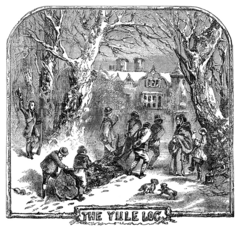Yule
| Yule | |
|---|---|
 Hauling a Yule log in 1832 | |
| Also called | Yuletide, Yulefest |
| Observed by | Various Northern Europeans, Germanic peoples, Neopagans, LaVeyan Satanists |
| Type | Cultural, Germanic Pagan then Christian, secular, contemporary Pagan and Satanic |
| Date | Varies |
| Frequency | Annual |
| Related to | Early Germanic calendars, Christmastide, Quarter days, Wheel of the Year, Winter festivals, Christmas |
Yule ("Yule time" or "Yule season") is a festival historically observed by the Germanic peoples. Scholars have connected the original celebrations of Yule to the Wild Hunt, the god Odin, and the pagan Anglo-Saxon Mōdraniht.
Later departing from its pagan roots, Yule underwent Christianised reformulation,[1] resulting in the term Christmastide. Some present-day Christmas customs and traditions such as the Yule log, Yule goat, Yule boar, Yule singing, and others may have connections to older pagan Yule traditions. Terms with an etymological equivalent to Yule are still used in Nordic countries and Estonia to describe Christmas and other festivals occurring during the winter holiday season. Today, Yule is celebrated in Heathenry and other forms of Neopaganism, such as Wicca with it being part of their Wheel of the Year, and is also observed by LaVeyan Satanists.
Etymology[]
Yule is the modern version of the Old English words ġēol or ġēohol and ġēola or ġēoli, with the former indicating the 12-day festival of "Yule" (later: "Christmastide") and the latter indicating the month of "Yule", whereby ǣrra ġēola referred to the period before the Yule festival (December) and æftera ġēola referred to the period after Yule (January). Both words are thought to be derived from Common Germanic *jehwlą-, and are cognate with Gothic WIKI